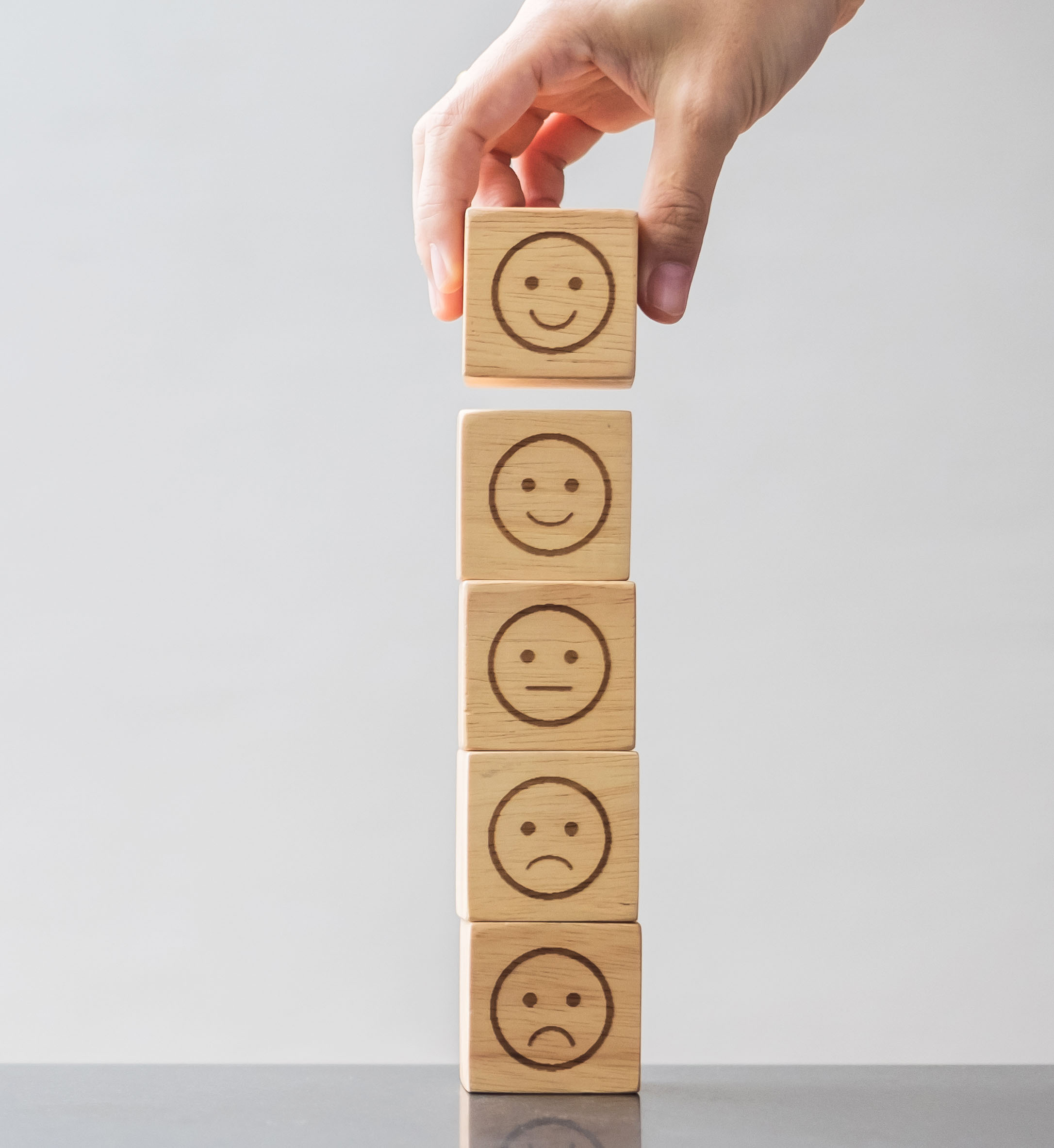We all experience feelings of emptiness from time to time. It is part of the secondary emotions being sadness the primary one. Other secondary emotions related to emptiness are: feeling abandoned, hopelessness, feeling depressed, loneliness, boredom, feeling ignored, feeling victimised, helplessness, defenceless, feeling apathetic, feeling vulnerable, indifferent and feeling melancholic.
There is an enormous amount of social pressure to having to fill the void and to be happy. The emptiness feeling is like any other unpleasant emotion, but there are some emotions that we tend to perceive as more unpleasant than others, and the feeling of emptiness is one of those unpleasant ones.
The truth is that feeling empty sometimes just indicates an unmet need that a person is experiencing, it frequently means being excited about something, experiencing a positive emotion, or having a concern about something that we don’t know how to name. The feeling of emptiness invites us to reconnect with our inner self and can help us identify what our unmet needs are.
The physical symptoms of the emptiness feeling usually include: A physical sensation in the pit of our stomach, a knot, or a feeling as if there is something to fill, a void inside of us (sometimes we eat, smoke, drink, seek physical contact and put other strategies in place to manage those physical sensations).

Where does the emptiness feeling come from?
The feeling of emptiness is a normal emotion and is part of the human repertoire and that we all experience every once in a while. It is sometimes related to different matters, such as low self-esteem, core beliefs (the ideas we have about ourselves, others, the world, etc.), loss of identity, having a diffuse identity, emotional dependency, experiencing a loss (something or someone), not having goals, not finding meaning, not finding a purpose or feeling that we are not doing something meaningful or we feel we are meaningless. Occasionally it can be related to personality disorders and/or depression.
Every time we have an emotion, it is an indicator of something. It is a message from our brain that there is an unmet need. For example, we may feel empty when we feel lonely, we have lost a relationship, a friend, a job, or our health in some way. We can then ask ourselves questions like: What are we loosing? To get to the root cause. Many patients ask themselves: Why doesn’t my uncomfortable emotion go away? Is it useful just to know where does it come from? Yes, because the main problem is wanting that unpleasant emotion to vanish. We are used to living without discomfort. Unpleasant emotions are very uncomfortable, but they always have some important message to give us. When that message is covered, or listened to, the emotions usually tend to dissipate. When those emotions arise, we can ask ourselves what we need without making any judgements.
Sometimes it is not enough to meet our needs or to deduce what we have lost. The feeling of emptiness occasionally activates something in our past, coping mechanisms that we used at some point in our lives to be able to survive.
When we name the emotion and its cause and detect which part comes from the current situation and which one comes from the past, it makes it easier for us to find a solution.
Let’s imagine a friend who all of a sudden starts to be cold and distant, and we don’t understand the reason. We analyse repeatedly what occurred and we can’t find a possible explanation. This can generate feelings of emptiness, guilt, anger…; but the emotion that emerges in that moment will depend on our previous experiences, together with the moment we are going through, the needs we have and our core values.

For example, when we have felt abandoned many times or as children, it will be easier for us to feel abandoned in this kind of situations. If justice (a value) is very important to us, we will be more likely to feel this as an injustice and feel angry about it. If we think we have done something wrong because we are often self-critical or concerned about what others think of us, we may feel guilty. If we don’t have anyone else right now, and they were the only person we talked to, we may feel empty or lonely. If it is a person with whom we shared a goal, we may also feel emptiness, loss of purpose or meaning in our lives.
How does this feeling affect our mental health?
No unpleasant emotion can affect our mental health, it is instead the ways we put in place to manage them or the unpleasant emotion’s intensity that play a role in our mental health. Emotions increase in intensity when we don’t give ourselves the time to be in touch with them, or when they are related to some thought pattern or emotional wound from our past. The most common thing we find in therapy is that people actually tend to tell themselves emotions shouldn’t be there, even when they think they are actually paying attention to them. The more we tell ourselves an emotion shouldn’t be there, or do things in order to fill the void or remove the emotion, the more intense it usually becomes.

Our brain is smarter than we think. The more we avoid something, the more we perceive it as dangerous and the scarier the situation will become next time. We tend to avoid what we find unpleasant. When we come into contact with an emotion that we have been avoiding for a long time, it will feel really intense and therefore we will avoid it even more.
How can these feelings affect interpersonal relationships?
Feeling empty might lead us to choose relationships that are not convenient for us to try to fill that void. For example, it is not the same to choose a relationship coming from a place of needing a partner than choosing it from a place of preferring a relationship, and this change between needing and preferring something can only be achieved when our personal needs are already covered.
When our start point is feeling empty, we may treat people differently. We may feel unlovable or not enough, and then we will act accordingly towards people around us. We then might leave relationships or get angry more often, or perceive things as a threat more regularly. We can even create a self-fulfilling prophecy by blaming ourselves for feeling empty: we feel empty, that leads us to react that way, then we receive consequences we don’t like, and we blame ourselves for starting from that point, which lowers our self-esteem, makes us feel empty, and then we start the cycle all over again.

What do we usually do when faced with such feelings, and how do we react to fill the void?
The main strategy all human beings normally use to deal with the feeling of emptiness is avoidance. Avoidance is a survival mechanism, and it is sometimes the only strategy we think we have that will work for us, because it actually reduces our distress in the short term. Avoidance consists on doing things so we can evade the unpleasantness of feeling empty. Some examples include: being endlessly busy, constantly seeing friends, using social networks regularly, trying to incessantly improve ourselves with self-help books, substance abuse, doing overtime at work, etc.
When we are in touch with our emotions it becomes easier to do something about them. Not having this emotional awareness can lead us to dedicate our effort to avoid these unpleasant emotions.
Sometimes in therapy we encounter people having trouble falling asleep at night. The reason for this is usually not giving ourselves enough space to process emotions during the day (analyse them, empathising with ourselves, look for solutions). As human beings we have emotions, and those emotions need to be processed sooner or later. When we don’t give ourselves the space to process our emotions our brain eventually processes them for us when we are not as busy (for example when we go to sleep). Procrastination is also linked to this phenomenon in which, when emotional needs have not been met, our brain tries to meet them at some other time (by postponing work). One thing is clear: the more we avoid the discomfort, the more intense it becomes.

What can we do when we have a feeling of emptiness? Strategies to follow
As acknowledged before, it is better when we don’t avoid our emotions. There are numerous social myths around the benefits of avoiding unpleasant emotions: we mistake having emotions with doing behaviours, we believe emotions will become unmanageable if we don’t avoid them and then we will become dysfunctional, or we tell ourselves these emotions are “silly” and therefore should not be there, or we think we already know what the problem is and it is not necessary to validate our experience.
Just imagine for a moment we have a healthy horse, eager to run and learn and in need of daily exercise. Now let’s visualize we lock our horse in a small stable for 2 months. How would the horse feel when he goes out for the first time? The first time we take that horse out he’ll gallop crazily, and he might even break a leg and would be impossible to ride on. It will definitely seem scary but that doesn’t mean we have to lock him away again for a longer period of time. This is what we tend to do with our emotions when they seem too scary. The ideal strategy to follow should be the same as the method we would do with our horse, to take them out every day until they become more bearable. We usually don’t allow ourselves to be in touch with our emotions because they seem too intense and scary, but the reason for this is not giving ourselves the space and time to process them. Some people believe they are too emotional and the main reason for being “too emotional” is not being in touch with our emotions enough. Emotions pile up the more we supress or avoid them.

Steps for handling unpleasant emotions and the emptiness feeling:
- Finding our emotions. To be able to observe and pay attention to them. What are you thinking about? What are you feeling? How does your body react? Do you have any physical sensations? Investigate the emptiness feelings´ possible cause. Does it remind you of something from your past?
- Experiencing the emotions as waves that come and go. To not try to block, suppress, push away or get rid of the emotions we are experiencing. To prove to ourselves that we can tolerate unpleasant emotions. This moment will pass if we allow ourselves to experience them long enough.
- Remembering we are not what we feel. To make peace with that specific emotion. To be able to accept it without judgement and without making it a part of our identity. It's just something we are feeling, it doesn't define us, and it is definitely not saying anything about us.
- Labelling. Naming it. Defining it. What does it mean? Can we describe it? How would we call it?
- Acceptance. Why is it normal to have that emotion? What would we tell a friend if they felt that way? Why do we have the right to feel that way? Keeping in mind an emotion is not and will never be a behaviour. They are two different things. Any emotion is valid, what we can sometimes work on are our behaviours. Emotions are just a result of physiological reactions to internal or external stimuli. We cannot force ourselves to not feel a certain way. We can only change the behaviours resulting from our emotions. We can also work on the association between situations and emotions in the long term.
- Emotional analysis. We can analyse which aspects of the situation have made us feel that way, and also understand the connection with our past and our way of understanding the world. It can also help us to analyse the emotion’s message (its function) and detect when it is a false alarm (something we learnt to survive in the past and that is no longer useful, because now the danger has passed).
- Using our strategies to support that emotion. Some examples of strategies to take care of our emotions are the following:
- Problem-solving techniques. To look for a solution to those emotions by asking ourselves what can we do (and is under our control) to cover the emotion´s needs.
- Emotional regulation techniques and distress tolerance skills.
- Mindfulness and meditation.
- Working with our core beliefs and with the cause that originated those beliefs about ourselves.
- Using self-compassion and self-care techniques. To see if we are being too hard on ourselves and to work on reducing our self-criticism.
- Seeking social connection, pleasurable activities and dopamine sources. To meet our basic needs such as hygiene, sleep and food.
- Time out. To spend time each day processing our emotions and accepting them as they are without making any judgement.
- To spend time with ourselves. It can help us find our identity, purpose, things we identify with and activities related to them.
- Defusion exercises. When everything becomes too overwhelming, we can practice disidentifying from those emotions with some practice.
8. Writing down our thoughts. When do we feel empty the most? Is it a very intense discomfort that lasts for a long time or can it be pinpointed to a specific situation? What does it inform us about? What happens right before we feel it? What do we usually think about when we are experiencing it?
Sometimes it becomes a real challenge for us to take a moment and see what we need when we are experiencing intense uncomfortable emotions or spirals of negative thoughts. What I always recommend in these cases is to rate our emotions from 0 to 10. When the emotional intensity is below 5, then we can stop, take a break and analyse what is happening to us and what we are feeling and needing. When we are running in front of a lion (and this is exactly how we feel when faced with an unpleasant emotion) it is really difficult to stop and ask ourselves the reasons why we went to that place, why are we not running fast enough, and whether or not the lion’s fur is beautiful. When the discomfort is over 5 out of 10, we can only devote ourselves to manage it in the best way possible by taking a cold shower, breathing techniques, cuddling a pillow, talking to a friend, doing an activity that calms us down, doing exercise, etc.

The feeling of emptiness is a basic human emotion that we all experience from time to time. When emotions feel too intense, unbearable or unmanageable or that last too long then we can put the above mentioned strategies in place. We can also work on raising our self-awareness about the times we try to avoid our discomfort and work on regulating those emotions in a different way.
Therapy can help when, after some time practicing these strategies you still feel that the feeling of emptiness is too intense and difficult for you to thrive. An experienced psychologist can also help you to explore other possible causes that might make you feel this way. They can also provide you with tools for emotional regulation and introspection in order to get to know what your needs are, be more in touch with yourself, your values and interests. Therapy can also help you understand if there are any wounds from your past or core beliefs that are getting triggered and affecting you in the present.
When we reconnect with our inner self, our self-esteem increases, unpleasant emotions become less intense, and it helps us to be able to communicate from the awareness of knowing what is happening to us and what we need and therefore act accordingly.
About the author
Marta Gray is a licenced Psychologist working at Sinews. She has a flexible approach combining different scientifically proven methods (Acceptance and commitment Therapy, CBT, EMDR) depending on the patient’s needs. Her main field of expertise is working with adults and she is specially interested in complex trauma, anxiety disorders, emotional deregulation and couple’s therapy.
Sinews MTI
Psychology, Psychiatry and Speech Therapy

